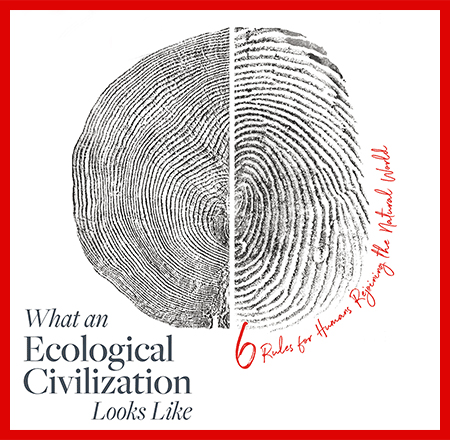WHAT DOES AN ECOLOGICAL CIVILIZATION LOOK LIKE?

What are the most needed changes we must make to create a world that ensures that basic needs are met and that people, and all life, thrive? For me one of the most critical needs is to change the way we think about our economy and our consumer habits. We are told that the only way to prosperity, security and happiness is to GROW the economy. But as economist David Korten says, ". . . children and adolescents grow. Adults mature. It is time to reframe the debate to recognize that we have pushed growth in material consumption beyond Earth’s environmental limits. We must now shift our economic priority from growth to maturity—meeting the needs of all within the limits of what Earth can provide." Read his article,"Why the Economy Should Stop Growing and Grow Up."
It is glaring omission that no matter how well-intended our leaders are to serve the common good, they rarely mention to necessity of NOT GROWING the economy because doing so has already gone beyond the capacity of the Earth to fulfill our continual and ever-growing material desires.
What can we do?
We can do the math and see that we've already bypassed our limits. You've probably heard of Earth Overshoot Day, the date that marks when humanity’s demand for ecological resources and services in a given year exceeds what Earth can regenerate in that year. It was August 22 in 2020. In 1990 it was October 11. In 1970 it was December 29. The math is clear.
The excerpt below is taken from The Guardian, an excellent article about building a circular economy and avoiding ecological disaster.
"We can starve the beast of consumerism, by buying less and reusing more of everything. We must change consumer habits and attitudes to consumption. . . It calls for a circular economy based on the principles of designing out waste and pollution by keeping products and materials in use.
"Can consumption ever be contained? Easily. Stuff can be designed better to last longer; food chains and toy makers don’t have to make poor quality goods; producers can use fewer virgin raw materials; waste can be made a resource; the circular economy can be developed. Tax can make corporations more responsible; excess can be discouraged in schools and homes; identities do not have to be based on how much we buy. We can shop hyper-locally, frequent secondhand shops, grow more food ourselves, become more self-sufficient. But above all, we can learn to just say no to buying ever more new stuff."
We can, as Korten points out, rebuild the strength and power of living communities. We can create a culture of mutual caring and responsibility. We can assure that the legal rights of people and communities take priority over those of government-created artificial persons called corporations, as well as require corporations to take environmental and social responsibility.
There are many areas of need we can, and must, engage in, like restoring our democracy, ending racism, stopping climate change, providing basic health care, education, housing and food for all. For me, respecting and living within the Earth's limits is perhaps top of the list.
Our time starts now.
Read "What Does an Ecological Civilization Look Like," from YES! magazine.
Back to Blog